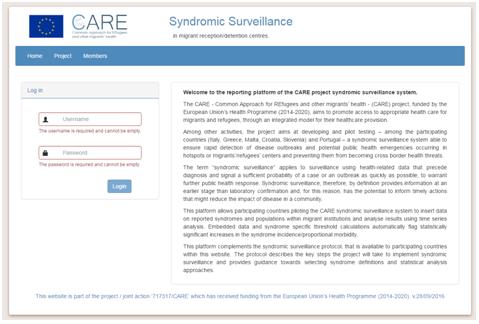The CARE syndromic surveillance system pilot and the information model on travel medicine for front-line health-care workers
With the month of October, under the guidance of the Italian Institute of Health (ISS) in Rome, the implementation phase of activities of the CARE project aimed at strengthening capacity to detect communicable diseases occurring among migrants has begun.
Migrants arriving to the EU are generally in good health. This is due to several factors, such as good pre-travel health status and the fact that most infectious diseases have much shorter incubation periods than the time required to journey across the recognized Mediterranean migration routes. Notwithstanding, travelling conditions might make some migrants more vulnerable to health threats, due to exposures before arriving to the EU combined with low vaccination coverage.
For this reason, on one side it is important to strengthen capacity for the rapid detection of outbreaks and potential public health emergencies occurring in hotspots or migrants’/refugees’ centres. In the other, it is also important for front line health-care workers assessing the health of newly arrived migrants in point of entry Southern European Union countries, to be aware of the epidemiology of disease and vaccination rates in countries of origin and transit of their patients.
Migrant holding centres have started to pilot the CARE syndromic surveillance system. The main objective of syndromic surveillance is to identify illness clusters early, before diagnoses are confirmed, in order to allow timely and appropriate public health response. The aim this surveillance system is therefore to strengthen the capacity to rapidly detect disease outbreaks and potential public health emergencies occurring in hotspots or migrants’/refugees’ centres. This pilot phase will be concluded in March 2017 and will test the procedures and tools developed during the preparatory phase and evaluate the system’s overall performance.
To meet the information needs of frontline health-care workers, the implementation of an information service model (dispatch) has also started. This is a travel medicine information service targeting epidemic prone diseases in countries part of recognized Mediterranean migration routes. Updated dispatches will be sent weekly to front line health-care workers in Italy, Greece, Croatia, Slovenia and Malta from October to December 2016. Following this date, the usefulness of the service will be evaluated.

